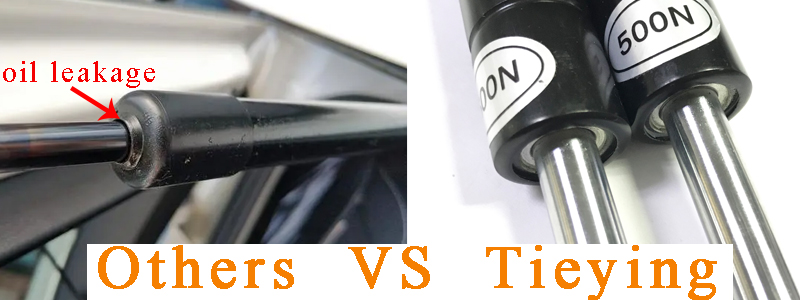Gas springs are essential components in many industrial and automotive applications. They are used to provide controlled force and motion in various mechanisms such as car hoods, office chairs, and hospital beds. However, one of the most common problems that gas springs face is oil leakage. Oil leakage can cause a range of issues, including reduced performance, premature failure, and safety hazards. Therefore, it is crucial to prevent gas springs from oil leakage. In this essay, we will discuss some effective ways to prevent gas springs from oil leakage.

Firstly, it is important to understand the causes of oil leakage in gas springs. Gas springs contain a pressurized cylinder filled with gas and oil. The gas provides the force, while the oil provides the damping effect. The oil seals inside the cylinder prevent the gas from leaking out and maintain the pressure. However, over time, these seals can wear out, crack, or become damaged due to various factors such as temperature changes, vibrations, and exposure to chemicals. When the seals fail, the oil can leak out, reducing the damping effect and causing the gas spring to malfunction.
To prevent oil leakage, one of the most effective ways is to choose high-quality gas springs from reputable manufacturers. High-quality gas springs are made from durable materials and designed to withstand harsh operating conditions. They also come with better seals that can resist wear and tear, reducing the risk of oil leakage. It is also important to choose the right gas spring for the application. Using the wrong gas spring can lead to premature wear and damage to the seals, leading to oil leakage.
Regular maintenance is another crucial step in preventing oil leakage in gas springs. Regular maintenance includes checking the gas spring for signs of wear and damage, such as cracks, dents, and leaks. If any issues are found, the gas spring should be repaired or replaced immediately. It is also important to lubricate the gas spring regularly to keep the seals in good condition. Lubrication helps to reduce friction and wear, preventing the seals from cracking or becoming damaged.
Proper installation is also key to preventing oil leakage in gas springs. Gas springs should be installed correctly, following the manufacturer's instructions. The installation should be done by a qualified technician who has experience in handling gas springs. The installation should also include proper alignment, orientation, and mounting of the gas spring. Improper installation can cause the seals to become misaligned or damaged, leading to oil leakage.
In addition to these preventive measures, there are some other tips that can help prevent oil leakage in gas springs. For example, gas springs should be stored in a dry, cool, and clean environment when not in use. Exposure to moisture, heat, and dirt can damage the seals and cause oil leakage. Gas springs should also be handled carefully, avoiding impacts or drops that can damage the seals. Finally, gas springs should be inspected regularly, even if there are no visible signs of wear or damage. Regular inspection can help detect any issues early and prevent them from becoming more severe.
In conclusion, preventing oil leakage in gas springs is crucial to ensure their optimal performance and longevity. High-quality gas springs, regular maintenance, proper installation, and careful handling are some of the most effective ways to prevent oil leakage. By following these tips, you can avoid the risks and costs associated with oil leakage in gas springs and ensure their reliable operation.
Post time: May-26-2023



